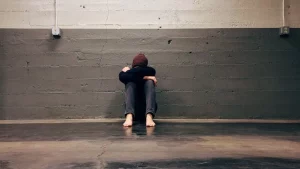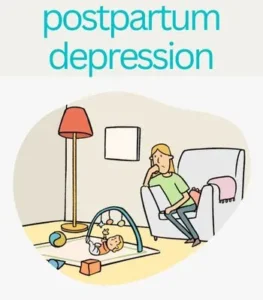postpartum depression
- Category affected by postpartum depression?
postpartum depression
After having a baby, a condition called postpartum depression emerges. 15% of persons may be impacted. Postpartum depression results in emotional ups and downs, frequent crying, tiredness, guilt, and worry in addition to trouble caring for the baby. Postpartum depression can be successfully treated with both therapy and medication.
What is postpartum depression?
Having a child changes your life forever. Parenting is a rewarding experience, but it can also be demanding and overwhelming. It’s normal to be nervous or hesitant, especially if you’re a first-time parent. But if you experience unexpected mood fluctuations, feel melancholy or lonely, or cry a lot, postpartum depression could develop.
Postpartum depression is depression that occurs after childbirth (PPD). Postpartum depression affects more than just the woman who gives birth. Adoptive and surrogate parents are also at risk. People go through hormonal, physical, emotional, monetary, and social changes after having a child. These modifications could lead to postpartum depression symptoms.
Know that you are not alone, that it is not your fault, and that help is available if you have postpartum depression. Your doctor or another medical practitioner can help you feel better by treating your symptoms.
What are the postpartum depression
Postpartum mood disorders come in three varieties:
Postpartum blues or baby blues
After giving delivery, 50% to 75% of people experience the baby blues. If you have the baby blues, you will cry for long periods for no apparent cause, as well as be unhappy and apprehensive. In the first week, the condition usually appears one to four days following delivery. Despite how terrible the situation is, it usually resolves itself within two weeks. The best course of action is to seek support and assistance from friends, family, or your spouse.
Postpartum depression
Postpartum depression, a much more hazardous condition than baby blues, affects about 1 in 7 new parents. If you’ve previously experienced postpartum depression, your risk rises to 30% with each pregnancy. Along with mood swings, incessant crying, impatience, and exhaustion, you could also feel guilty, anxious, and incapable of taking care of yourself or your child. Mild to severe symptoms may start to show up a week after delivery or gradually, even up to a year later. Even though symptoms can continue for several months, psychotherapy or antidepressants are very effective forms of treatment.
Postpartum psychosis
For postpartum psychosis, a severe form of postpartum depression, quick medical attention is necessary. This sickness affects only 1 in 1,000 persons after delivery, making it extremely rare. Symptoms usually appear shortly after delivery, are severe, and last for several weeks to months. Symptoms include severe agitation, perplexity, feelings of helplessness and embarrassment, sleeplessness, paranoia, hallucinations or delusions, hyperactivity, rapid speech, or mania. Postpartum psychosis needs immediate medical attention due to the increased risk of suicide and significant harm to the pregnant child. Medication, counseling, and hospitalization are all common treatments.
Who is affected by postpartum depression?
Postpartum blues are common. Up to 75% of people suffer the baby blues after giving birth. One in every five of these mothers, or 15%, will suffer from postpartum depression. One in every 1,000 women suffers from postpartum psychosis.
How can I know if I have baby blues or postpartum depression?
Baby blues are a typical postpartum side effect. Baby blues and postpartum depression have many of the same symptoms. However, baby blues effects are milder and last for about 10 days. Symptoms of postpartum depression are more severe and might linger for weeks or months.
If any of the following describes you:
- Have fits of weeping.
- being overpowered
- You become apathetic.
- I can’t fall asleep.
- experience erratic mood swings
Never forget that informing your doctor about your symptoms will not harm you. They can tell you if your symptoms require medical treatment.
How long does postpartum depression last?
Postpartum depression can linger for up to a year following the birth of your child. This does not, however, imply that you should experience a “cure” within a year. Discuss your symptoms and treatments with your healthcare professional. Tell the truth about your feelings. Consider carefully whether your current state of health is better than it was before your diagnosis. They can then suggest continuing medical care for your problems.
What variables enhance my chances of developing postpartum depression?
- Some factors increase your risk of experiencing postpartum depression:
- a personal or familial history of depression, postpartum depression, or premenstrual dysphoric disorder (PMDD).
- a constrained social network
- Conflict in a marriage or other connection.
- Concerns around pregnancy.
- Complications related to pregnancy, such as illness, challenging deliveries, or early delivery
- You’re a parent by yourself or under 20 years old.
- Having a baby with special needs or one who cries a lot
What are the symptoms of postpartum depression?
Some people are embarrassed by their symptoms or assume they are horrible parents for having them. Postpartum depression is extremely common. It does not make you a bad person; you are not alone in feeling this way.
You may be suffering from postpartum depression if you have any of the following symptoms:
Sadness, worthlessness, hopelessness, or guilt are all examples of negative emotions.
- Excessive anxiety or tension
- A lack of interest in prior activities or hobbies
- Variations in appetite or a lack thereof
- Energy and motivation have declined.
- Having trouble falling asleep or constantly wanting to sleep.
- Excessive crying or sobbing without reason may create thinking or attention problems.
- Suicidal ideas or intent to die
- Lack of enthusiasm for or discomfort in the presence of your child
- Discontentment with having children or thoughts of hurting them.
What causes postpartum depression?
The link between abrupt hormone drops after pregnancy and depression warrants additional investigation. Progesterone and estrogen levels increase tenfold during pregnancy but drop substantially after delivery. Three days after birth, the levels of these hormones restore to pre-pregnancy levels.
In addition to these biological changes, having a child causes social and psychological changes that raise the risk of postpartum depression. For example, your body may physically change, you may sleep less, you may be concerned about raising your children, or your relationships may change.
Can postpartum depression affect my baby?
Yes, your baby can develop postpartum depression. You must get medical attention for yourself and your unborn child.
According to studies, your infant may be affected by postpartum depression in the following ways:
- It’s hard for you to bond with and connect with your baby.
- There’s a chance that your child is having trouble at school or with their behavior.
- You have the choice to cancel your child’s doctor appointments.
- Your child may experience problems with eating and sleeping.
- Your child may be at increased risk for obesity or developmental problems.
- You can neglect to provide for your child’s needs or fail to notice when they are ill.
- Social skills may be weak in your child.
How is postpartum depression diagnosed?
There is no specific test for detecting postpartum depression. Your healthcare professional will evaluate you at your postpartum checkup. A physical examination, a pelvic exam, blood testing, a discussion of your medical history, and how you’ve been feeling since giving birth may be part of this visit. Many doctors schedule prenatal checks to screen for depression two or three weeks following delivery. This ensures that you receive the assistance you require as soon as possible.
To determine if you have postpartum depression, they could administer a depression test or ask you several questions. They’ll inquire about your and your child’s health. Be frank with your physician to present an accurate picture of your feelings and views. They can help you determine whether your symptoms are normal or if you have postpartum depression.
How is postpartum depression treated?
Postpartum depression is treated in a variety of methods, depending on the nature and severity of your symptoms. Treatment options include anxiety or depression medications, talk therapy or cognitive behavioral therapy, and participation in support groups.
Medication for melancholy, anxiety, and psychosis may be included in the treatment strategy for postpartum psychosis. You can also be admitted to a treatment facility for a few days until you’re stable. If you do not improve after receiving this treatment, electroconvulsive therapy (ECT) may be beneficial.
Don’t believe that since you’re breastfeeding, you can’t take medicine for depression, anxiety, or even psychosis. With your healthcare provider, go over your options.
What are ways to cope with postpartum depression?
It’s normal to feel overwhelmed. Having a baby is difficult, and parenting is fraught with ups and downs. If you are depressed, you do not have to suffer in silence. Your doctor can aid you in locating an effective treatment for you.
Here are some coping tactics for postpartum depression:
- Locate a supportive listener to talk to, such as a therapist, friend, relative, or someone else.
- Join a support group for new parents.
- Make an effort to eat healthily and exercise frequently.
- Prioritize your rest.
- Call your friends on the phone or go out with them.
- Schedule time for yourself and your hobbies or preferred activities, such as reading.
- Request help with your errands or domestic duties.

